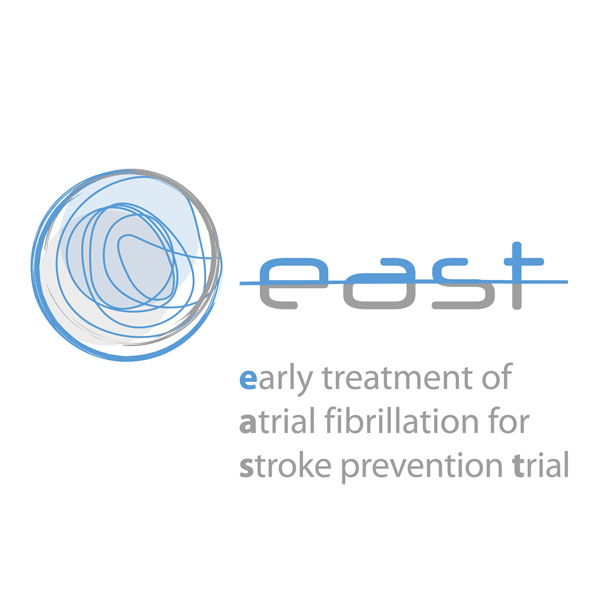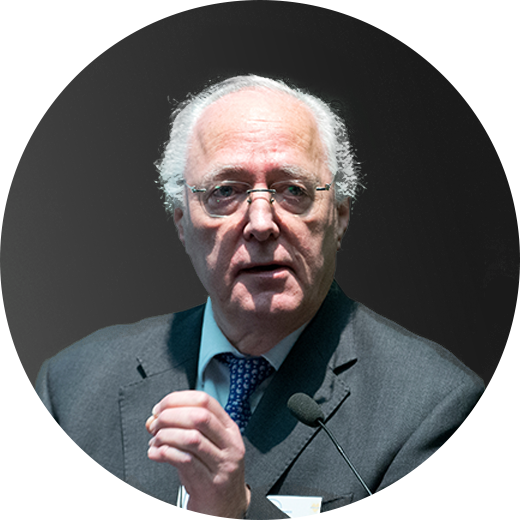
EAST-AFNET 4
Early treatment of atrial fibrillation for stroke prevention trial (EAST)
study design
Investigator-driven, prospective, parallel-group, randomised, open-label trial with blinded-outcome assessment (PROBE-Design). Multi-centre trial for Prevention of Stroke in High-risk Subjects with Atrial Fibillation

Inclusion Criteria
![]() Recent-onset AF (≤ 1 year prior to enrolment)
Recent-onset AF (≤ 1 year prior to enrolment)
![]() At least one ECG within recent 12 months that documents AF whereas the AF episode must last longer than 30 sec.
At least one ECG within recent 12 months that documents AF whereas the AF episode must last longer than 30 sec.
One of the following:
![]() age > 75 years or
age > 75 years or
![]() prior stroke or transient ischemic attack
prior stroke or transient ischemic attack
OR two of the following:
![]() age > 65 years,
age > 65 years,
![]() female sex,
female sex,
![]() arterial hypertension (chronic treatment for hypertension, estimated need for continuous antihypertensive therapy or resting blood pressure > 145/90 mmHg),
arterial hypertension (chronic treatment for hypertension, estimated need for continuous antihypertensive therapy or resting blood pressure > 145/90 mmHg),
![]() diabetes mellitus (treated by drugs or insulin) or impaired glucose tolerance
diabetes mellitus (treated by drugs or insulin) or impaired glucose tolerance
![]() severe coronary artery disease (previous myocardial infarction, CABG or PCI)
severe coronary artery disease (previous myocardial infarction, CABG or PCI)
![]() stable heart failure (NYHA II or LVEF <50%),
stable heart failure (NYHA II or LVEF <50%),
![]() left ventricular hypertrophy on echocardiography (more than 15 mm wall thickness),
left ventricular hypertrophy on echocardiography (more than 15 mm wall thickness),
![]() chronic kidney disease (MDRD stage III or IV),
chronic kidney disease (MDRD stage III or IV),
![]() peripheral artery disease.
peripheral artery disease.
![]() Provision of signed informed consent.
Provision of signed informed consent.
![]() Age ≥ 18 years.
Age ≥ 18 years.
Exclusion Criteria
![]() Any disease that limits life expectancy to less than 1 year.
Any disease that limits life expectancy to less than 1 year.
![]() Participation in another clinical trial, either within the past two months or ongoing
Participation in another clinical trial, either within the past two months or ongoing
![]() Previous participation in the EAST trial.
Previous participation in the EAST trial.
![]() Pregnant women or women of childbearing potential not on adequate birth control: only women with a highly effective method of contraception [oral contraception or intra-uterine device (IUD)] or sterile women can be randomized.
Pregnant women or women of childbearing potential not on adequate birth control: only women with a highly effective method of contraception [oral contraception or intra-uterine device (IUD)] or sterile women can be randomized.
![]() Breastfeeding women.
Breastfeeding women.
![]() Drug abuse.
Drug abuse.
![]() Prior AF ablation or surgical therapy of AF.
Prior AF ablation or surgical therapy of AF.
![]() Previous therapy failure on amiodarone, e.g. patients who suffered from symptomatic recurrent AF that required escalation of therapy while on amiodarone.
Previous therapy failure on amiodarone, e.g. patients who suffered from symptomatic recurrent AF that required escalation of therapy while on amiodarone.
![]() Patients not suitable for rhythm control of AF.
Patients not suitable for rhythm control of AF.
![]() Severe mitral valve stenosis.
Severe mitral valve stenosis.
![]() Prosthetic
Prosthetic
![]() Clinically relevant hepatic dysfunction requiring specific therapy.
Clinically relevant hepatic dysfunction requiring specific therapy.
![]() Clinically manifest thyroid dysfunction requiring therapy. After successful treatment of thyroid dysfunction, patients may be enrolled when their thyroid function is controlled.
Clinically manifest thyroid dysfunction requiring therapy. After successful treatment of thyroid dysfunction, patients may be enrolled when their thyroid function is controlled.
![]() Severe renal dysfunction (stage V, requiring or almost requiring dialysis).
Severe renal dysfunction (stage V, requiring or almost requiring dialysis).
hypothesis
Early, structured rhythm control therapy based on antiarrhythmic drugs and catheter ablation can prevent atrial fibrillation (AF) related complications in patients with AF when compared to usual care.
Conclusion
The effectiveness of early rhythm control is mediated by the presence of sinus rhythm at 12 months in the EAST-AFNET 4 trial. Clinicians implementing ERC should aim for rapid and sustained restoration of sinus rhythm in patients with recently diagnosed AF and cardiovascular comorbidities.
PATIENTS
STUDY CENTRES
in 11 European countries
Study duration
Start of study
2011
End of study
2020
Study information for download
Publications
Aliot E, Brandes A, Eckardt L, Elvan A, Gulizia M, Heidbuchel H, Kautzner J, Mont L, Morgan J, Ng A, Szumowski L, Themistoclakis S, Van Gelder IC, Willems S, Kirchhof P. The EAST study: redefining the role of rhythmcontrol therapy in atrial fibrillation: EAST, the Early treatment of Atrial fibrillation for Stroke prevention Trial. Eur Heart J. 2015 Feb 1;36(5):255-6. doi: 10.1093/eurheartj/ehu476. PMID: 25646394.
Eckardt L, Sehner S, Suling A, Borof K, Breithardt G, Crijns H, Goette A, Wegscheider K, Zapf A, Camm J, Metzner A, Kirchhof P. Attaining sinus rhythm mediates improved outcome with early rhythm control therapy of atrial fibrillation: the EAST-AFNET 4 trial. Eur Heart J. 2022 Oct 21;43(40):4127-4144. doi: 10.1093/eurheartj/ehac471. PMID: 36036648; PMCID: PMC9584752.
Fabritz L, Al-Taie C, Borof K, Breithardt G, Camm AJ, Crijns HJGM, Roth Cardoso V, Chua W, van Elferen S, Eckardt L, Gkoutos G, Goette A, Guasch E, Hatem S, Metzner A, Mont L, Murukutla VA, Obergassel J, Rillig A, Sinner MF, Schnabel RB, Schotten U, Sommerfeld LC, Wienhues-Thelen UH, Zapf A, Zeller T, Kirchhof P. Biomarker-based prediction of sinus rhythm in atrial fibrillation patients: the EAST-AFNET 4 biomolecule study. Eur Heart J. 2024 Aug 31:ehae611. doi: 10.1093/eurheartj/ehae611. Epub ahead of print. PMID: 39215973.
Fabritz L, Chua W, Cardoso VR, Al-Taie C, Borof K, Suling A, Krause L, Kany S, Magnussen C, Wegscheider K, Breithardt G, Crijns HJGM, Camm AJ, Gkoutos G, Ellinor PT, Goette A, Schotten U, Wienhues-Thelen UH, Zeller T, Schnabel RB, Zapf A, Kirchhof P. Blood-based cardiometabolic phenotypes in atrial fibrillation and their associated risk: EAST-AFNET 4 biomolecule study. Cardiovasc Res. 2024 Jul 2;120(8):855-868. doi: 10.1093/cvr/cvae067. PMID: 38613511; PMCID: PMC11218688.
Goette A, Borof K, Breithardt G, Camm AJ, Crijns HJGM, Kuck KH, Wegscheider K, Kirchhof P; EAST-AFNET 4 Investigators. Presenting Pattern of Atrial Fibrillation and Outcomes of Early Rhythm Control Therapy. J Am Coll Cardiol. 2022 Jul 26;80(4):283-295. doi: 10.1016/j.jacc.2022.04.058. PMID: 35863844.
Gottschalk S, Kany S, König HH, Crijns HJ, Vardas P, Camm AJ, Wegscheider K, Metzner A, Rillig A, Kirchhof P, Dams J. Cost-effectiveness of early rhythm control vs. usual care in atrial fibrillation care: an analysis based on data from the EAST-AFNET 4 trial. Europace. 2023 May 19;25(5):euad051. doi: 10.1093/europace/euad051. PMID: 36966734; PMCID: PMC10227663.
Jensen M, Suling A, Metzner A, Schnabel RB, Borof K, Goette A, Haeusler KG, Zapf A, Wegscheider K, Fabritz L, Diener HC, Thomalla G, Kirchhof P. Early rhythm-control therapy for atrial fibrillation in patients with a history of stroke: a subgroup analysis of the EAST-AFNET 4 trial. Lancet Neurol. 2023 Jan;22(1):45-54. doi: 10.1016/S1474-4422(22)00436-7. PMID: 36517170.
Kany S, Al-Taie C, Roselli C, Pirruccello JP, Borof K, Reinbold C, Suling A, Krause L, Reissmann B, Schnabel RB, Zeller T, Zapf A, Wegscheider K, Fabritz L, Ellinor PT, Kirchhof P. Association of genetic risk and outcomes in patients with atrial fibrillation: interactions with early rhythm control in the EAST-AFNET4 trial. Cardiovasc Res. 2023 Aug 7;119(9):1799-1810. doi: 10.1093/cvr/cvad027. PMID: 37264683; PMCID: PMC10405565.
Kirchhof P, Wegscheider K, Breithardt G. Early Rhythm Control in Atrial Fibrillation. Reply. N Engl J Med. 2021 Feb 4;384(5):484-485. doi: 10.1056/NEJMc2032433. PMID: 33534984.
Kirchhof P, Camm AJ, Goette A, Brandes A, Eckardt L, Elvan A, Fetsch T, van Gelder IC, Haase D, Haegeli LM, Hamann F, Heidbüchel H, Hindricks G, Kautzner J, Kuck KH, Mont L, Ng GA, Rekosz J, Schoen N, Schotten U, Suling A, Taggeselle J, Themistoclakis S, Vettorazzi E, Vardas P, Wegscheider K, Willems S, Crijns HJGM, Breithardt G; EAST-AFNET 4 Trial Investigators. Early Rhythm-Control Therapy in Patients with Atrial Fibrillation. N Engl J Med. 2020 Oct 1;383(14):1305-1316. doi: 10.1056/NEJMoa2019422. Epub 2020 Aug 29. PMID: 32865375.
Kirchhof P, Breithardt G, Camm AJ, Crijns HJ, Kuck KH, Vardas P, Wegscheider K. Improving outcomes in patients with atrial fibrillation: rationale and design of the Early treatment of Atrial fibrillation for Stroke prevention Trial. Am Heart J. 2013 Sep;166(3):442-8. doi: 10.1016/j.ahj.2013.05.015. Epub 2013 Jul 30. PMID: 24016492.
Metzner A, Suling A, Brandes A, Breithardt G, Camm AJ, Crijns HJGM, Eckardt L, Elvan A, Goette A, Haegeli LM, Heidbuchel H, Kautzner J, Kuck KH, Mont L, Ng GA, Szumowski L, Themistoclakis S, van Gelder IC, Vardas P, Wegscheider K, Willems S, Kirchhof P. Anticoagulation, therapy of concomitant conditions, and early rhythm control therapy: a detailed analysis of treatment patterns in the EAST – AFNET 4 trial. Europace. 2022 Apr 5;24(4):552-564. doi: 10.1093/europace/euab200. Erratum in: Europace. 2022 Apr 5;24(4):564. doi: 10.1093/europace/euab277. PMID: 34473249; PMCID: PMC8982435.
Rillig A, Eckardt L, Borof K, Camm AJ, Crijns HJGM, Goette A, Breithardt G, Lemoine MD, Metzner A, Rottner L, Schotten U, Vettorazzi E, Wegscheider K, Zapf A, Heidbuchel H, Willems S, Fabritz L, Schnabel RB, Magnussen C, Kirchhof P. Safety and efficacy of long-term sodium channel blocker therapy for early rhythm control: the EAST-AFNET 4 trial. Europace. 2024 Jun 3;26(6):euae121. doi: 10.1093/europace/euae121. PMID: 38702961; PMCID: PMC11154137.
Rillig A, Magnussen C, Ozga AK, Suling A, Brandes A, Breithardt G, Camm AJ, Crijns HJGM, Eckardt L, Elvan A, Goette A, Gulizia M, Haegeli L, Heidbuchel H, Kuck KH, Ng A, Szumowski L, van Gelder I, Wegscheider K, Kirchhof P. Early Rhythm Control Therapy in Patients With Atrial Fibrillation and Heart Failure. Circulation. 2021 Sep 14;144(11):845-858. doi: 10.1161/CIRCULATIONAHA.121.056323. Epub 2021 Jul 30. PMID: 34328366; PMCID: PMC8456351.
Rillig A, Borof K, Breithardt G, Camm AJ, Crijns HJGM, Goette A, Kuck KH, Metzner A, Vardas P, Vettorazzi E, Wegscheider K, Zapf A, Kirchhof P. Early Rhythm Control in Patients With Atrial Fibrillation and High Comorbidity Burden. Circulation. 2022 Sep 13;146(11):836-847. doi: 10.1161/CIRCULATIONAHA.122.060274. Epub 2022 Aug 15. PMID: 35968706.
Van Gelder IC, Ekrami NK, Borof K, Fetsch T, Magnussen C, Mulder BA, Schnabel R, Wegscheider K, Rienstra M, Kirchhof P; EAST-AFNET 4 Trial Investigators. Sex Differences in Early Rhythm Control of Atrial Fibrillation in the EAST-AFNET 4 Trial. J Am Coll Cardiol. 2023 Feb 28;81(8):845-847. doi: 10.1016/j.jacc.2022.12.011. PMID: 36813380.
Willems S, Borof K, Brandes A, Breithardt G, Camm AJ, Crijns HJGM, Eckardt L, Gessler N, Goette A, Haegeli LM, Heidbuchel H, Kautzner J, Ng GA, Schnabel RB, Suling A, Szumowski L, Themistoclakis S, Vardas P, van Gelder IC, Wegscheider K, Kirchhof P. Systematic, early rhythm control strategy for atrial fibrillation in patients with or without symptoms: the EAST-AFNET 4 trial. Eur Heart J. 2022 Mar 21;43(12):1219-1230. doi: 10.1093/eurheartj/ehab593. PMID: 34447995; PMCID: PMC8934687.
Van Gelder IC, Haegeli LM, Brandes A, Heidbuchel H, Aliot E, Kautzner J, Szumowski L, Mont L, Morgan J, Willems S, Themistoclakis S, Gulizia M, Elvan A, Smit MD, Kirchhof P. Rationale and current perspective for early rhythm control therapy in atrial fibrillation. Europace. 2011 Nov;13(11):1517-25. doi: 10.1093/europace/eur192. Epub 2011 Jul 22. PMID: 21784740; PMCID: PMC3198586.
Scientific Leader

Prof. Paulus Kirchhof
Hamburg

Prof. Günter Breithardt
Münster

Prof. Harry Crijns
Maastricht

Prof. John Camm
London
Further information
Registration
ClinicalTrials.gov: NCT01288352
ISRCTN: ISRCTN04708680
EudraCT: 2010-021258-20
Support
The trial is supported by
European Heart Rhythm Association (EHRA)
Deutsche Zentrum für Herz-Kreislauf-Forschung (DZHK)
sponsor
Kompetenznetz Vorhofflimmern e.V. (Atrial Fibrillation NETwork, AFNET), Münster, Germany